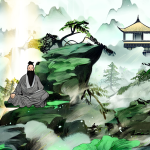《师说》原文

古之学者必有师。师者,所以传道受业解惑也。人非生而知之者,孰能无惑?惑而不从师,其为惑也,终不解矣。生乎吾前,其闻道也固先乎吾,吾从而师之;生乎吾后,其闻道也亦先乎吾,吾从而师之。吾师道也,夫庸知其年之先后生于吾乎?是故无贵无贱,无长无少,道之所存,师之所存也。
嗟乎!师道之不传也久矣!欲人之无惑也难矣!古之圣人,其出人也远矣,犹且从师而问焉;今之众人,其下圣人也亦远矣,而耻学于师。是故圣益圣,愚益愚。圣人之所以为圣,愚人之所以为愚,其皆出于此乎?爱其子,择师而教之;于其身也,则耻师焉,惑矣。彼童子之师,授之书而习其句读者,非吾所谓传其道解其惑者也。句读之不知,惑之不解,或师焉,或不焉,小学而大遗,吾未见其明也。巫医乐师百工之人,不耻相师。士大夫之族,曰师曰弟子云者,则群聚而笑之。问之,则曰:“彼与彼年相若也,道相似也。位卑则足羞,官盛则近谀。”呜呼!师道之不复,可知矣。巫医乐师百工之人,君子不齿,今其智乃反不能及,其可怪也欤!
圣人无常师。孔子师郯子、苌弘、师襄、老聃。郯子之徒,其贤不及孔子。孔子曰:三人行,则必有我师。是故弟子不必不如师,师不必贤于弟子,闻道有先后,术业有专攻,如是而已。
李氏子蟠,年十七,好古文,六艺经传皆通习之,不拘于时,学于余。余嘉其能行古道,作《师说》以贻之。
中文翻译
古代求学的人一定有老师。老师,是用来传授道理、教授学业、解答疑难问题的人。人不是生下来就懂得道理的,谁能没有疑惑?有了疑惑,如果不跟从老师学习,那些成为疑难问题的,就最终不能理解了。生在我前面,他懂得道理本来就早于我,我应该跟从他把他当作老师;生在我后面,如果他懂得的道理也早于我,我也应该跟从他把他当作老师。我学习的是道理,哪管他的生年比我早还是比我晚呢?因此,无论地位高低贵贱,无论年纪大小,道理存在的地方,就是老师存在的地方。
唉!古代从师学习的风尚不流传已经很久了,想要人没有疑惑难啊!古代的圣人,他们超出一般人很远,尚且跟从老师而请教;现在的一般人,他们的才智低于圣人很远,却以向老师学习为耻。因此圣人就更加圣明,愚人就更加愚昧。圣人之所以能成为圣人,愚人之所以能成为愚人,大概都出于这吧?人们爱他们的孩子,就选择老师来教他;但是对于他自己呢,却以跟从老师学习为可耻,真是糊涂啊!那些孩子们的老师,是教他们读书,帮助他们学习断句的,不是我所说的能传授那些道理,解答那些疑难问题的。一方面不通晓句读,另一方面不能解决疑惑,有的句读向老师学习,有的疑惑却不向老师学习;小的方面倒要学习,大的方面反而放弃不学,我没看出那种人是明智的。巫医乐师和各种工匠这些人,不以互相学习为耻。士大夫这类人,听到称“老师”称“弟子”的,就成群聚在一起讥笑人家。问他们为什么讥笑,就说:“他和他年龄差不多,道德学问也差不多。以地位低的人为师,就觉得羞耻,以官职高的人为师,就近乎谄媚了。”唉!古代那种跟从老师学习的风尚不能恢复,从这些话里就可以明白了。巫医乐师和各种工匠这些人,君子们不屑一提,现在他们的见识竟反而赶不上这些人,真是令人奇怪啊!
圣人没有固定的老师。孔子曾以郯子、苌弘、师襄、老聃为师。郯子这些人,他们的贤能都比不上孔子。孔子说:“几个人一起走,其中一定有可以当我的老师的人。”因此学生不一定不如老师,老师不一定比学生贤能,听到的道理有早有晚,学问技艺各有专长,如此罢了。
李家的孩子蟠,年龄十七,喜欢古文,六经的经文和传文都普遍地学习了,不受时俗的拘束,向我学习。我赞许他能够遵行古人从师的途径,写这篇《师说》来赠送他。
英文翻译
In ancient times, those who studied had teachers. A teacher is someone who imparts knowledge, teaches skills, and resolves doubts. People are not born with knowledge. Who can be free from doubts? If one has doubts but does not learn from a teacher, the doubts will never be resolved. Those who were born before me and understood the truth earlier than I did, I should follow them as my teachers; those who were born after me and also understood the truth earlier than I did, I should also follow them as my teachers. I learn from the truth, so why should I care whether they were born before or after me? Therefore, regardless of status, high or low, noble or humble, and regardless of age, old or young, wherever there is the truth, there is a teacher.
Alas! The tradition of learning from teachers has long been lost! It is difficult for people to be free from doubts! The sages of ancient times were far superior to ordinary people, yet they still learned from their teachers and asked them questions. Nowadays, ordinary people are far inferior to the sages, but they are ashamed to learn from teachers. As a result, the sages become even more sage, and the fools become even more foolish. Is it not because of this that the sages are sages and the fools are fools? People love their children and choose teachers to teach them; but when it comes to themselves, they are ashamed to learn from teachers. How absurd! The teachers of children only teach them to read books and practice punctuation, not the kind of teachers I mean who can impart knowledge and resolve doubts. They do not know how to punctuate, and they cannot resolve their doubts. They learn from teachers for minor things but neglect the major ones. I do not see their wisdom. People such as witches, doctors, musicians, and craftsmen do not feel ashamed to learn from each other. But the scholars and officials, when they hear the terms "teacher" and "student", gather in groups and laugh at them. When asked why, they say, "The age of that person and that person is similar, and their knowledge is also similar. It is shameful to learn from someone of lower status, and it is almost flattery to learn from someone of higher official position." Alas! It can be seen that the tradition of learning from teachers cannot be restored. Witches, doctors, musicians, and craftsmen are despised by the gentlemen, but now their wisdom is actually inferior to these people. How strange!
A sage has no fixed teacher. Confucius learned from Tanzi, Chang Hong, Shixiang, and Lao Dan. These people, such as Tanzi, were not as virtuous as Confucius. Confucius said, "When three people walk together, there must be one who can be my teacher." Therefore, students are not necessarily inferior to their teachers, and teachers are not necessarily more virtuous than their students. Some understand the truth earlier, and some specialize in certain fields of knowledge. That's all.
Li Pan, the son of the Li family, is seventeen years old. He likes ancient prose and has a general understanding of the classics and commentaries of the Six Arts. He is not restricted by the customs of the time and learns from me. I appreciate his ability to follow the ancient way of learning from teachers. I wrote this "On Teachers" to give it to him.
背景补充
创作背景
《师说》大约是作者于贞元十七年至十八年(公元801 - 802年),在京任国子监四门博士时所作。当时,魏晋以来的门阀制度仍有沿袭,贵族子弟无论学业如何,都可以做官。他们不需要学习,也看不起老师,尊“家法”而鄙从师。而韩愈当时任国子监四门博士,是一个“从七品”的学官,职位不高,但他却积极倡导从师而学的风气,与当时的社会风气相对抗。
写作目的
韩愈写这篇文章,是为了抨击当时士大夫阶层“耻学于师”的恶劣风气,阐明教师的重要作用和从师学习的必要性,提倡能者为师、不耻下问的从师之道,以恢复古代从师而学的优良传统。
文章影响
《师说》是一篇具有深远影响的文章,它打破了当时士大夫阶层对从师学习的偏见,对后世的教育观念产生了积极的推动作用。它强调了教师的重要性,鼓励人们不耻下问、虚心学习,这种思想在后世得到了广泛的传播和认可,成为了中国传统文化中的重要组成部分。同时,《师说》在文学史上也有着重要的地位,它的论证严密、逻辑清晰,语言简洁生动,具有很高的艺术价值,是古代散文中的经典之作。












评论功能已关闭。